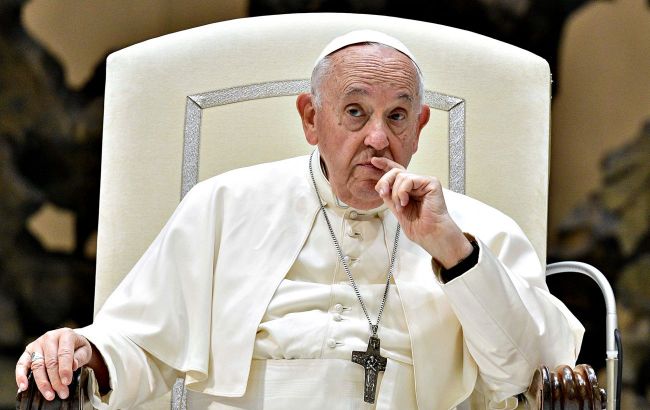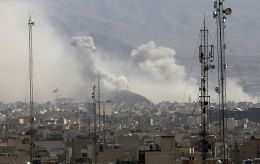Pope Francis dies
 Photo: Pope Francis (Getty Images)
Photo: Pope Francis (Getty Images)
Pope Francis died at the age of 88, according to the Vatican.
“Pope Francis died on Easter Monday, April 21, 2025, at the age of 88 at his residence in the Vatican's Casa Santa Marta,” the statement said.
The death of Pope Francis was announced by Cardinal Kevin Farrell, Camerlengo of the Holy Roman Church.
“Dear brothers and sisters, it is with deep sadness that I must announce the death of our Holy Father Francis. Today at 7:35 a.m., Bishop Francis of Rome returned to his Father's house. His entire life was dedicated to the service of the Lord and his Church,” he said.
The pontiff died after an illness. On February 14, he was hospitalized with bronchitis, but in the hospital he developed bilateral pneumonia, accompanied by asthmatic attacks. He was periodically given oxygen. Initially, doctors assessed the 88-year-old pontiff's condition as critical.
However, after more than 5 weeks of treatment for pneumonia, he was discharged from the hospital on March 23. Doctors recommended him to rest for two more months to fully recover.
On April 16, it was reported that the Pope would not lead the pre-Easter rituals and services as he was still recovering from his illness.
The day before, on Sunday, April 20, the pontiff met with US Vice President JD Vance after he criticized the Trump administration for its policy of deporting foreigners.
The meeting between Vice President Vance and the Pope did not last long. The parties only exchanged Easter greetings.
On Easter, Pope Francis also appeared before the faithful for the first time since his illness and mentioned the war in Ukraine. On the balcony of St. Peter's Basilica, he merely greeted the faithful on the holiday: “Brothers and sisters, Happy Easter!”
The rest of his blessing was read by one of his assistants. In his address, the pontiff called for an end to the war in Ukraine and Gaza.
“May the risen Christ grant Ukraine, devastated by war, his Easter gift of peace, and encourage all parties involved to pursue efforts aimed at achieving a just and lasting peace... In this Jubilee year, may Easter also be a fitting occasion for the liberation of prisoners of war and political prisoners,” the Pope said in his speech.
Biography of Pope Francis
Pope Francis is the first ever head of the Catholic Church from a New World country, who has implemented a number of reforms in the Vatican and has progressive views on pressing social issues.
Before receiving the title, his name was Jorge Mario Bergoglio. He was born in Buenos Aires on December 17, 1936, to Italian immigrants. His father worked for the railroad. He studied at the seminary in Buenos Aires.
Before Jorge Mario decided to dedicate himself to the church, he worked as a nightclub security guard, laboratory assistant, and janitor. He first felt the calling to serve as a priest at the age of 17 during one of the festive services.
At the age of 21, Bergoglio decided to join the Jesuit order and began studying the humanities, first in Chile, then continued his studies in Buenos Aires and earned an academic degree in philosophy. After that, he worked as a teacher of literature, philosophy, and theology at Catholic colleges in Buenos Aires.
In 1980, Jorge Mario Bergoglio was appointed rector of St. Joseph's Seminary, and after defending his dissertation, he became spiritual director of the Archdiocese of Córdoba in Argentina.
In the church service, Bergoglio held various positions in the Jesuit order of Argentina, was bishop of Buenos Aires, and in 2001 was named a cardinal in the Vatican. He headed several councils and congregations in the Roman Curia. He was known for his modest lifestyle. He refused to use a company car and lived in a small apartment. In 2005, Bishop Bergoglio was nominated as a candidate for the papacy, but he did not receive enough votes.
On March 13, 2013, Jorge Mario Bergoglio was elected the 266th Pope. He chose a name in honor of St. Francis of Assisi, which was used for the first time among the heads of the Vatican.
Francis became the first pope in over 1,200 years of non-European origin, and the first head of the Catholic Church from the New World. He is also the first Jesuit pope.
What Pope Francis is remembered for
The Pope launched the website and app “Click to pray”, which allows you to pray anytime and anywhere. He presented it on a tablet during one of his Sunday sermons.
Francis ordered the installation of showers for the homeless in St. Peter's Square in the Vatican. Later, such booths began to appear in other church parishes in Rome.
In 2016, the heads of the Catholic and Russian Orthodox Churches met for the first time. Pope Francis spoke with Patriarch Kirill in Havana.
For the first time in history, the Vatican was audited in 2013. Pope Francis supported the anti-corruption reform and ordered the publication of the annual report on the financial operations of the Vatican Bank.
He initiated a reform to simplify the recognition of marriages as invalid. He also criticized clergymen who refused to baptize children born out of wedlock. According to the pontiff, the mothers of such children do not deserve to be condemned, unlike those who have had an abortion.
On homosexual relations, Pope Francis' opinion has changed. In 2010, he spoke out against same-sex marriage in Argentina and the adoption of children by gay couples. Later, he stated that members of the LGBT community should not be discriminated against. Also in 2020, he supported the development of laws for gay “civil unions” to help protect their rights.
What he said about the war in Ukraine
Pope Francis has repeatedly spoken out about Russia's aggression against Ukraine, calling for peace and an end to violence. He called the war a “shameful catastrophe for all mankind.” In general, his position on the Russian-Ukrainian war was based on calls for peace, dialogue, and an end to violence, although some of his statements were perceived ambiguously.
For example, in March 2024, in an interview with the Swiss broadcaster RSI, Pope Francis said that “the strongest is the one who has the courage of the white flag.” This statement provoked a mixed reaction, and the Vatican explained that the pontiff was not calling for Ukraine's surrender, but emphasized the importance of dialogue.
In January 2025, Francis expressed hope for an end to the war in Ukraine. He called on the international community to work to create conditions for a just and lasting peace.
“My wish for this year of 2025 is that the entire international community should work first and foremost to put an end to the war that has been washing the blood of martyred Ukraine for almost three years and has claimed a huge number of victims, including many civilians,” the pontiff said.

